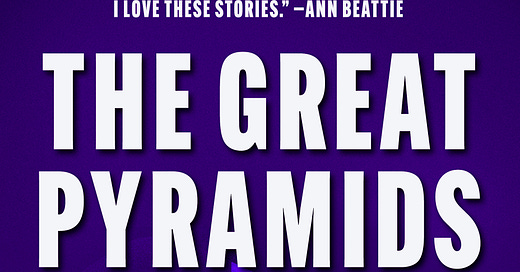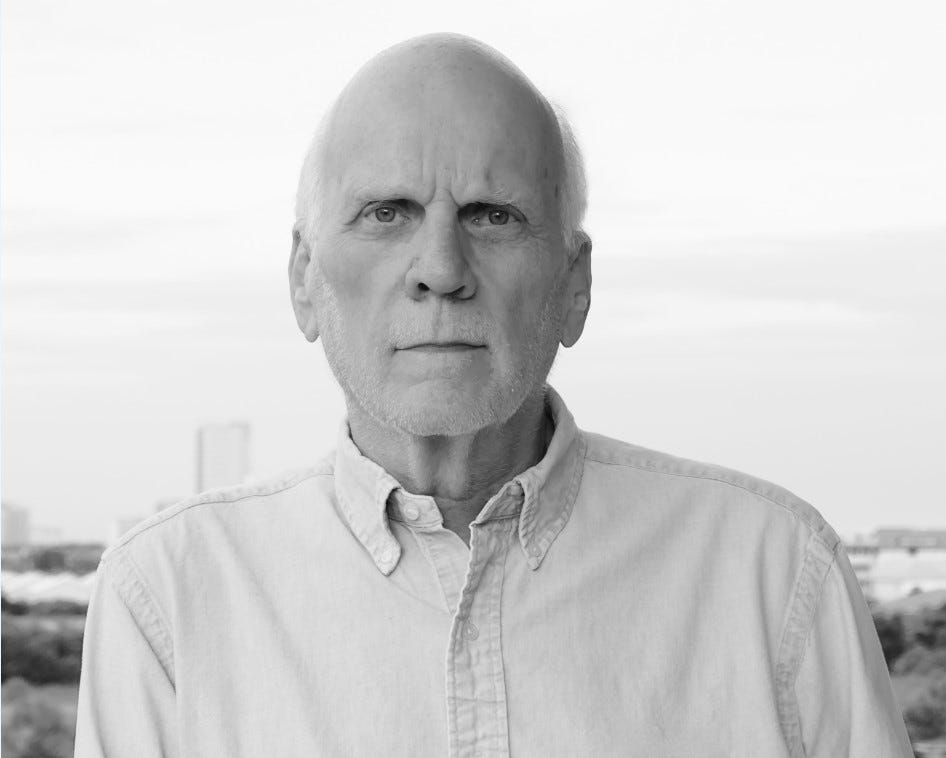April, well, it’s the cruelest. However, we are very proud to release two new titles that will act as beacons into the Spring—The Great Pyramids by Frederick Barthelme (with a foreword by Bret Easton Ellis) and Blowing Up Everything Is Beautiful by James Robins.
The Great Pyramids, a short-story collection by Frederick Barthelme, will be available on April 8th. (More information below. Pre-order The Great Pyramids here.)
"He's audacious and writes like no one else—I love these stories.” —Ann Beattie
"I admire his peculiar grasp of the slant side of human relationships. Superbly written and very funny."—Raymond Carver
"In the course of such stories, we are allowed to witness tiny, hidden moments of vulnerability, intimacy, and even beauty."—Michiko Kakutani
Further on in the month, on April 29, we will also be releasing Blowing Up Everything Is Beautiful, a collection of essays on the ongoing Palestine–Israel conflict by award-winning independent journalist and historian James Robins, a bold, radical, and independent new voice. James Robins’ work has appeared in The New Republic, The Guardian, The Spectator, and the TLS among other news outlets. He writes the newsletter The Dreadnought and lives in London. (You can pre-order his book here.)
“This book is a must-read . . . As Robins demonstrates with heart-breaking detail, the US has been supporting the worst crimes imaginable against the Palestinian people in Gaza, leaving them with nothing but scorched earth. . . This book could not be more timely and urgent. It is a plea for decency and humanity.”—Dan Kovalik is the author of The Case for Palestine: Why It Matters and Why You Should Care
“It has rarely been more important to get the first draft of history right, and to this project Robins has made a valuable contribution.”—Erik Baker, author of Make Your Own Job: How the Entrepreneurial Work Ethic Exhausted America
The Great Pyramids by Frederick Barthelme
Frederick Barthelme, brother of the author Donald Barthelme, is the author of sixteen books of fiction and nonfiction, including novels, a memoir, and short-story collections, most notably, to me at least, Moon Deluxe, which was published in 1983 by Simon & Schuster. His stories have appeared in many prestigious journals and magazines over the years, but in the 1980s, the bulk of his stories were published by The New Yorker, where he worked closely with Veronica Geng who was then a fiction editor at the magazine.
The Great Pyramids is a collection of his work from throughout the years, including classic stories from The New Yorker era, as well as a couple that are previously unpublished. His stories, no matter the era, were always able to portray the immensity of feeling that saturates seemingly insignificant details of banality. From parking lots to grocery stores, and swimming pools to morning traffic, the inner landscape of Barthelme’s characters is one of underlying tension arising from the mundane. This career-spanning collection reflects Barthelme’s compassionate, wry, beguilingly deep observations of cultural estrangement and floating dread—and his sardonic, sometimes absurdist, commonplace-bleak, yet compassionate understanding of how we relate to one another in a world that subverts relationships, but still dares us to try.
Bret Easton Ellis provides a foreword for this collection. In it, he conveys how Barthelme showed us a new way to look at the world, and helped redefine the short story: a “signal” heard by writers—and readers—of younger generations.
BLACK TIE
An excerpt from The Great Pyramids
*Originally published in the South Carolina Review (1982)
At midnight Paul says, “Shh! Be quiet!” He shakes Katherine’s shoulder; she jerks awake. She is beautifully draggled, her hair lank, sparkling across her temple to her cheek.
“What?” she says.
“Shh! Quiet! I heard something.”
“Paul,” she says, removing his hand from her shoulder, “there are no burglars, there is no junkie, the escapees are all escaping in some other direction. Less than four percent of the population is burglarious—the odds are good. Go to sleep.”
He pushes a hand at her face, wags a finger back and forth, accidentally catches her on the chin.
This makes her angry.
“The criminals are interested in diamonds and animals, but as you suspect, Paul, there are many with eyes only for you.” She goes to the bathroom and returns with a Sucrets, three aspirin, a glass of salt water, a heating pad, a jar of Vicks VapoRub, two Rolaids, a tablespoon of Gelusil, a wet washcloth, and an antiphlogistine. “Here,” she says.
He is quiet for a minute, then says, “I feel better already.”
“Ah, don’t be silly,” Katherine says. “I’m beginning to think you aren’t serious.”
“I know,” he says. “I know. Does everyone else know?”
“Who’s paying attention?”
“Oh . . . forces of evil, governments, friends.”
She looks at Paul with a curious look: “What is evil?”
“Let’s go out,” he says.
“Out? Where? It’s dark! No.”
They get into the car and drive out Telegraph Street toward the bridge, the country, the fields of corn and the flocks of crow. The midnight air is thick and heavy and wet; Katherine rolls her window halfway up; the pearl highway lamps hang above them and slide by, green flying circles over the hood and into the glass, one after another.
Katherine says, “I liked freeways until they became popular. They’re nice in movies. Want to go to a movie? No, I guess it’s too late. We should take a trip, Paul. Do you want to take a trip? No, I guess not. Are we going to sing on this drive?”
“You feel okay?” Paul says.
“You mean, do I need a change? Is my life unfull? Should I get involved? Well, no. That view has fallen from favor. Meaning must be found in the self, Paul, only I looked there already.”
“With small success,” he says. “We could use some singing.”
“Recognition of our signal, anyway.”
She sticks Paul in the side with the tire gauge, using it like a false knife the blade of which slips into the handle when the knife is pressed into service.
“Maybe riches,” Katherine says, “and . . . slaves?”
She puts the tire gauge away, takes out the map, opens it, puts it in her lap, and holds it there while she gets a Pentel out of the glove compartment. Rolls her window down. Turns on the map light.
“Alignment?” she says. “Is that it?”
“Formerly, I was loath to align. I’m still sort of loath to align. I mean, I don’t know.”
“Let me get this straight, Paul,” she says. “I want to get this straight. You desire alignment, so-called. However, you want to specify . . . what? Income? Caste?”
She marks a bomb pattern on the map, makes airplane noises, flies her hand over the target, runs into bad weather, drops the bombs.
“How I feel. I want to specify how I feel.”
“Well, how do you feel?”
“Better,” he says. “I guess I feel a whole lot better than I used to. Still, we’ve smiled and slept, and laughter’s been ours, but inadequate. We’ve tried bitterness and public angst, we’ve tried to not pay attention, we’ve told carnival jokes and fiddled the bull fiddle—with twenty-odd fingers into the act you’d think our double stop would be out of sight, but you’d be wrong. Our double-stop technique is the envy of no responsible players. Piano people only nod, graciously; tenormen hoot and honk and hack and hum. How do I feel? I feel we will not learn.”
She sighs: “The way we were born, what we have done.”
Paul turns the steering wheel of the car so that the car rolls right into the bright lights of an all-night filling station.
“Where are we?” Katherine asks. “I smell gas,” Katherine says.
The attendant stares at Katherine. He is sitting on a stool in his glass booth on the island where the gas pumps are. Paul stares at the attendant. When Katherine goes to the ladies’ room, the attendant watches her go. Then Paul asks for two dollars’ worth of regular gas.
“Sure, okay,” the attendant says. “Regular gas.”
Paul gives the man a five-dollar bill, then walks to the station’s edge where the concrete, lovely and smooth, gives way to weeds, piled tires, a sweeping horizon of poles, black rectangles, high skeletons, hot distant lights, and running wires. Paul stands there.
The attendant hands Paul three dollars and a strip of Black Gold trading stamps and an eight-ounce glass with a rendering of the National Dance Company of Siberia in action frosted on its side.
“Thanks,” Paul says.
“Sure, sure,” the attendant says. “Where you headed?”
“Carnegie-Mellon, if the weather holds.”
The attendant nods and Paul looks at the sky. Katherine returns with two RC Colas, three candy bars, and a package of peanuts. As she gets into the car the attendant bends to watch. She waves the peanuts at him.
“You got a ways to go yet,” the attendant says to Paul. “Best take it slow.”
Paul thanks him and starts the car. Katherine puts an unwrapped Snickers in Paul’s mouth, an open RC Cola on the seat between his legs, and she drops the peanuts on the glove compartment door. “The thing that has been lost,” she says, “is faith—you remember faith? But, Paul, it’s not so bad; we could ease into it—a book, a fiery fire; intrigue, immorality, faraway places—it might work.”
“No, no, no, no,” he says.
“Oh, right. I forgot. We must cast our seed carefully. However, Paul, the wayside can be quite pleasant in spots. Look there! And . . . what’s that? You see, a flight of nightbirds. How pretty. We’ll be all right, Paul. We can start, we can build a new life, a new time. Where is imagination? Spirit? Will?”
“Frittered,” he sighs, “away.”
“Oh, pooh,” she says.
He turns off the highway, down an unmarked road; dust rises into the air. Paul stops half a mile in, facing the highway; the night is full of cries, howls, jingles and jangles. Short drifts of wind bring the sizzle of tires on the highway.
“We don’t belong here, Paul,” she says. “It’s fake.”
He opens his door and puts his foot in the doorjamb and takes a drink of RC and rolls his head back and gargles his throat.
She says: “Makes me nervous, you know? Feels fishy. We can’t stay here, Paul. We have to go back. Nobody lives here. We don’t live here.”
The panel lights glow a favorable green.
Paul says: “Some troubles are worse than ours, probably. I like it here, Katherine, it’s nice—these fields, the dark, the breeze, the size.”
“The battery,” she says.
“You’re lovely, Katherine. You’re lovely and you’re right—the battery. Yet here, our failure seems small; we’re not doing so bad, we have a grace here on our knees—screw the battery. Let’s get stranded. Let’s stay.”
“Bugs.”
“I forgot about bugs.”
Paul takes the key out of the lock and pushes the light knob and flips the blinker back and forth and rocks the wheel and puts his heel on the black button in the doorjamb.
“We should help somebody.”
“How about me?” she says. She gets out of the car and walks around in the field. Then she comes up on Paul’s side of the car and twists his foot.
“Sometimes,” he says, “a thing is as beautiful as its name.”
“True,” she says. “But Paul, your rigor’s misplaced. There are only two questions. The first question is: Hope? The second question is: What happened? As to the first question I’d say yes—I mean, what’ve we got to lose? And on the second and more interesting question, I give up. We’re frightened. From fear we infer guilt. And we are the judge, Paul. And we are the jury. We are the prosecuting attorneys, the witnesses, and the court-appointed lawyers for the defense. We are the Department of Corrections, the slam. And the warden and the guards guarding. And Paul darling, when the tomahawk swings, it’s our hand in sweat on the shank, us on the block.”
“Discomfort,” he says. “Responsibility.”
“I think so, yes. Plain old responsibility.”
“Well,” he says, “I don’t think what has been lost has been lost at all, Katherine, I think it’s been hidden.”
“Ahh, don’t be silly, Paul. Start the car.”
He starts the car. She tosses her RC into the ditch and gets in the car and they drive to the highway and head home. Katherine puts away the tire gauge, and the map, and the pliers, and the Pentel.
The moon is full.
At the house she helps Paul close the garage door. They stand in the driveway: she hugs him.
“This is okay,” she says. “Wind, street—coming home, Paul. Not a bad finish; not a bad world. I mean, right?”
Paul says: “I like you, Katherine.”
“And why not? I walk, talk, ambulate, somnambulate, fox trot— why not like me?”
Praise for Frederick Barthelme
"His textures are impeccable: rich, brightly colored, they seem to float on an underlying vacancy like mirages, leaving the reader dizzy and a little sunstruck. . .it’s impossible to conceive of any writer doing what he does any better than he does it."—Margaret Atwood
“[Barthelme] is one of the most distinctive prose stylists since Hemingway, capable of writing sentences so sharp and crisp and suggestive they have a palpable glow.” —Bret Easton Ellis
“Consumer passions didn’t seem pasted on in these stories, but rather create a texture and a spooky land for modern fairy tales. . . . At first glance scenes appear to be surrealistic; then you carry on and realize that this is our urbanized, wised-up America.” —The New York Times Book Review







